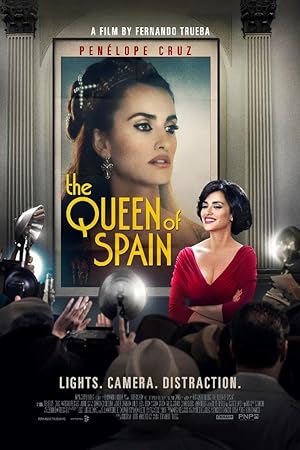The Queen of Spain is a more overt and optimistic, comedic Tarantinoesque historical fantasy of Spanish moviemakers’ role in resisting Franco’s fascism. This film is a sequel to The Girl of Your Dreams, which was released nineteen years prior. The Spanish cast and crew are still the underdogs, but instead of being forced to go abroad to work, they have to collaborate with Americans, who are actively trying to evade McCarthy’s scrutiny. Unlike the first one, there is less initial moral ambiguity regarding whether or not the viewers should be rooting for them.
All but one of the original Spanish cast returns, and the one who does not return is replaced by a Spanish acting icon, Javier Camara, one of several actors in these films who also frequently appears in Pedro Almodovar’s films. Most of the original characters have aged more than others, but all have changed since the initial film. All but one, Macarena, Penelope Cruz’s character, have failed to make it big, but the director suffered the worst since he did not even have the solace of his craft and company to console him. You should pay close attention to the opening black and white newsreel footage. There is a blink and you’ll miss it moment that explains everything.
The Queen of Spain primarily focuses on the director and Macarena and compares and contrasts their adjustment to returning to Spain. Cruz is explicitly the star of The Queen of Spain and the movie within the movie. In The Girl of Your Dreams, Goebbels casually suggests that she should star as Queen Isabella in a movie because the historical figure drove out all the Jews from Spain. In a strange turn of events, Goebbels’ idea comes true, but for shallower and less anti-Semitic reasons. Similar to the first film, Macarena leads the revolutionary charge, but less out of self-interest and more from a position of privilege: she is American, famous, wealthy, talented and beautiful. She will not suffer negative consequences if caught unlike her colleagues, who share her revolutionary sympathies, but have none of her advantages.
Self-interest and empathy converge because they are all victims of the fascist regime. Pina sighs, “He [Franco] keeps busy by making life miserable for Spainards from sunrise to sunset.” Even though we see the most extreme effect of life under fascism, we never get to see the little ways that he makes life difficult, but are told about them quite often. It is a missed opportunity, but it does not hurt the momentum of the film. One could even argue that it is not necessary, but the enervating sense of oppression for those outside of the labor camp would have been welcomed. If it is there, and I did not notice because of my lack of familiarity with Spanish culture and history, I apologize.
The Queen of Spain still manages to make grand missteps and use them as jokes instead of taking them seriously. One actor’s off screen rape is basically used as a running joke towards the second half of the film. Why did anyone think that would be funny? No. Also Cruz is gorgeous, but even if I were into that side of the aisle, if I was in a labor camp, my first thought would not be to grope her. Her complete lack of interest confirmed my theories in the first one—she was never into your old ass! She showed no wistfulness as if she was meeting an old lover that she once had feelings for. This film is sexually problematic and seems to wink at all levels of sexual harassment unless you’re a historically renowned fascist.
I still preferred The Queen of Spain to The Girl of Your Dreams because the tone was more consistent. Also the uncredited role in The Queen of Spain is the tributes to classic filmmaking littered throughout. In the first film, Emilio Ruiz del Rio worked on foreground miniatures, and in this film, he becomes a character, and we get to see his usually indiscernible work. There is a seamless Natalie and Nat Cole Unforgettable video style moment with Cruz and a still living legend that is worth your time. Who is Cary Elwes supposed to be imitating?
The Queen of Spain is not a must see film, but it was a joyful movie that elevates the importance of artists in resistance against evil and fulfills our wish that we had the ability to face evil and win while looking fabulous. Sadly I discovered after watching the movie, that this installment also was plagued with not giving proper credit where it was due, but this time, it was to the writers of the first film. Perhaps it is time to stop dramatizing notable turning points in Spanish film history until they hire a good lawyer.
Stay In The Know
Join my mailing list to get updates about recent reviews, upcoming speaking engagements, and film news.





